Dentures: Cost, Types, Procedure, Care & Alternatives
Written & Reviewed by –

Dentures have been the most popular treatment option for the replacement of missing teeth. It can be of two types- complete or partial. Complete dentures are used to replace the teeth in fully edentulous patients and partial dentures are used when some of the teeth are missing. In this article, we will cover the following concern topics-
WHAT ARE COMPLETE DENTURES?
Complete dentures replace the entire dentition and restore the functions of esthetics, mastication, and speech. The complete edentulous condition is most often seen in the elderly and geriatric individuals. The denture is a removable prosthesis that is an artificial substitute for missing natural teeth. Denture help in restoring speech, chewing ability, and aesthetics. It also helps in the preservation of remaining oral tissues.

Dentures can be of two types- Conventional or Immediate.
An immediate denture is fabricated immediately following the removal of natural teeth for a limited time after that it is replaced by a permanent or definitive denture. Whereas, in the conventional denture, it is fabricated after proper healing of gums after removal of teeth.
The benefit of immediate denture over conventional denture is that patients need not be remaining without teeth even for a single day. Patients’ tongue position and muscle tone are maintained and speech and chewing habits are also not hampered because of extraction. Also, there are fewer chances of ridge resorption.
Immediate dentures also have the disadvantage that they require additional appointments and cost and it is also not possible in every case. Only your dentist can select the proper case in which immediate denture is possible.

WHAT ARE PARTIAL DENTURES?
Partial dentures replace the teeth and surrounding structure in partially edentulous patients with an artificial substitute.
Partial dentures can be of three types-
- Acrylic partial dentures
These are made up of gum-like pink-colored acrylic resin on missing teeth area and wrought metal wire extension on existing teeth.
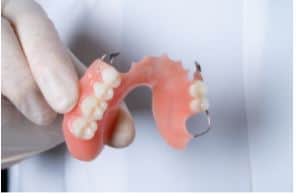
- Cast partial denture
Denture base and teeth are made up of acrylic resin but they consist of a metal framework.
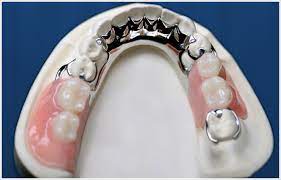
- Flexible partial dentures
Unlike traditional partial dentures, which are made up of hard, pink-colored acrylic, they are made of soft and flexible resin-like thermoplastics. Also, rather than using the wrought wire metal clasp for retention, it is having a flexible and esthetic resin extension that fits in between the teeth and gums and provides good retention.
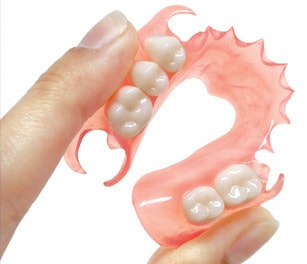
Advantages of flexible partial dentures-
- Less likely to show allergic reaction as it is BPA-free.
- Fewer chances of staining
- More comfortable because of flexibility
- Esthetically more pleasing as the metal extension is not present on teeth
- More retention and usually does not require denture adhesives
- Minimal chances of breakage as it flexible and can bend
- Lightweight and thin
Disadvantages Of Flexible Partial Denture-
Though flexible partial dentures are more comfortable to the patients, they still it has downsides-
- Flexible dentures cost between $700 and $3,000, making them a more expensive option than normal dentures.
- Adjustment is difficult and requires proper skills
- More prone to bacterial buildup
- It is a good advanced treatment option to consult with your dentist.
BENEFITS OF DENTURE-
- Improved ability to chew food and improved mastication
- The main advantage of a removable denture is that it can be removed easily and you can perform proper cleaning and brushing.
- It prevents the remaining teeth from extensive wear
- Facial appearance is improved by eliminating the sagging of cheeks. People feel self-conscious because of missing teeth, it helps in gaining self-confidence by removing gaps and mimicking the natural appearance.
- Dentures are made customized according to the patient’s jaw size so they are very comfortable. If jaw size changes with time, a new set can be made easily or changes can be done in the previous denture.
DRAWBACKS OF DENTURE-
- Certain types of food cannot be eaten with the dentures like candies, corn on the cob as denture can be dislodged from its position
- A certain time is required to adjust with the new denture.
- There are chances of plaque buildup beneath the denture or around the metal clasp in partial denture which can damage the remaining teeth
- Sometimes, it becomes very embarrassing when denture slips while speaking and eating
- Dentures can not be worn overnight
- If food gets trapped under the denture it can lead to gum disease or fungal infection
COST OF DENTURES
The cost of the treatment of dentures depend on various factors-
- The type of teeth & acrylic
- Fabrication technique used for it
- It also depends on if a general dentist or a specialist (prosthodontist) doing it. A prosthodontist can use different types of materials and instruments (facebow ) during the procedure depending upon the various clinical findings.
- Location of the dentist
- Additional procedures required such as extractions or any bone surgery
- Complexity of denture
Full Set of Dentures cost
Basic- $600 to $1000
Premium- $4000 to $8000
Partial- $700 to $1800
Implant Supported- $30000 to $50000
Cost of Dentures in Different Countries
| Country | Low | High |
| Albania | $260 | $764 |
| Australia | $746 | $1,937 |
| Brazil | $2,000 | $1,796 |
| Bulgaria | $184 | $315 |
| Costa Rica | $527 | $885 |
| Croatia | $522 | $1,020 |
| Egypt | $340 | $910 |
| Hungary | $568 | |
| India | $188 | $515 |
| Ireland | $398 | $1,932 |
| Italy | $1,312 | |
| Jordan | $282 | $747 |
| Lebanon | $1,000 | $1,350 |
| Malaysia | $189 | |
| Malta | $626 | |
| Mexico | $394 | $653 |
| Nepal | $23 | $171 |
| Philippines | $187 | $569 |
| Poland | $285 | |
| Singapore | $124 | $620 |
| South Africa | $269 | $654 |
| Spain | $827 | $1,111 |
| Thailand | $218 | $727 |
| Turkey | $863 | $1,153 |
| United Arab Emirates | $1,362 | |
| United Kingdom | $1,035 | |
| Vietnam | $167 | $913 |
HOW DENTURES ARE MADE?
- IMPRESSION
First of all, negative replicas or impressions of upper and lower jaws are made.
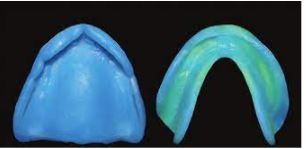
- WAX BLOCKS
Then, bite blocks are made with wax and bite and teeth orientation is made. In this step, the patient will decide the shape, size, and color of teeth with the help of a dentist.
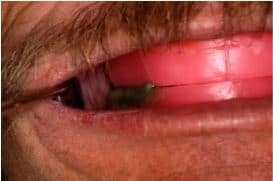
- TRY-IN
This is the most critical step in denture processing as it is very difficult and painstaking to make corrections in the final denture. The mock-up will be sent by the lab technician. The final color, size, texture, speech, and appearance are checked by placing it in the mouth.
Your dentist will ask you to bring a close- relative or friend for approval or suggestion as if the denture is realistic and reasonable. After that, consent is signed for the appearance and functioning of the trial denture by the patient.
This is the final step for your denture fitting. The base is processed with pink-colored acrylic with premade teeth (as shown during try-in) embedded in the denture base. some final adjustments are made by the dentist and denture is fitted in the patient’s mouth with some instructions.
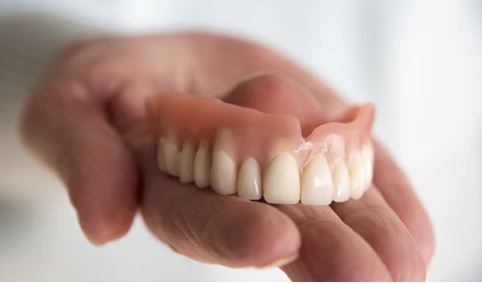
INSTRUCTIONS TO THE PATIENT?
This is very important for the patient’s who are going to use the dentures for the first time. Some instructions regarding denture are-
DENTURE INSERTION AND REMOVAL–
- It is very important to learn to wear and remove the denture. As the upper denture is large and more retentive, so preferably upper denture should be worn first and during removal as same, lower denture is removed first followed by upper denture
Can dentures be worn 24 hours a day?
- Dentures should not be worn overnight as continuous pressure on the bone can lead to faster bone loss and the fitting of the denture will get loosened
WHAT DO NEW DENTURES WILL FEEL LIKE, OR WHAT TO EXPECT FROM NEW DENTURES?
- It is very common to feel awkward in the beginning as some foreign object is placed in your mouth.
- The gagging sensation is very common in starting in first-time denture wearers.
- Speech sound also usually feel altered
- Salivary flow is increased
- A lower denture may be dislodged during speech and eating
- Soreness may occur
- Feeling of mouth being full
How long does it take for a new denture to feel normal?
Generally, it takes around 30 days to adjust to the new denture. Here, are some methods to understand the adjustment with the new denture.
HOW TO USE DENTURES
- Tongue position
The patient should be trained to stabilize the dentures particularly the mandibular denture. Mouth opening and closing must be practiced with the tongue in the forward front teeth position. If the upper denture feels loosened, close the mouth and swallow, which will elevate the denture and reseat it.
- Eating
Eating with the new denture is quite difficult in the beginning. Eating efficiently requires training and patience and usually requires 6-8 weeks to chew comfortably.
- Speech
Initially, there may be discomfort while speaking due to the presence of a palatal plate, the initial feeling of bulk, and excessive saliva. Patients should be encouraged to read loudly and repeat words that give trouble.
- Sneezing and coughing
Extreme sneezing and coughing can dislodge the denture and can cause embarrassment which can be avoided by covering the mouth with a handkerchief.
CARE FOR DENTURES
- Dental plaque must be removed properly and regularly as it can cause denture stomatitis, bad odor, and bone loss.
- Patients need to rinse their mouth and denture after every meal, if possible.
- At night, the dentures should be brushed gently with cleanser or mild dish soap using a soft denture brush to remove the plaque. Never use ordinary toothpaste or household cleaners as they can cause scratches on the denture. While brushing, the dentures should be held over a container of water so that the water cushions the impact if they slip out of the hand and fall as dentures are fragile and can fracture on fall
- Soak the denture in any commercially available denture-cleansing agent and allowed it to remain overnight
- Never use hot water to soak the denture as it will distort the denture.
- Then, in the morning denture should be brushed and worn
- Occasional soaking of the denture in the white vinegar helps in removing the calculus or calcific deposits as it contains acetic acid.
DENTURE ALTERNATIVES
If you don’t want to have dentures because of some limitations, there are some alternative options to get your beautiful smile back. The best decision for your smile is based on many factors like number of missing teeth, jaw density, cost factor and oral condition. Here are some alternatives who do not want dentures-
Dental bridge is the most common, low risk and affordable option for the replacement of missing teeth. Dental bridge fills the gap created by the missing of one or more teeth and helps you restore your smile and chewing ability. Bridges have main benefit over denture that it doesn’t move or slip while eating and talking as in denture. This option has the drawbacks that it can be done only when one or two teeth are missing adjacent to healthy teeth on both the sides and natural teeth need to be reduced to accommodate the bridge. Otherwise, it can be a very good alternative option.
- Overdenture-
Overdentures are mainly used when either all of the teeth are lost or few teeth are present. They can be implant retained(if denture is held in place by implants) or tooth retained(if denture is held by remaining teeth). Overdentures are more comfortable option as denture do not move while talking and chewing like conventional dentures. Also, they help in preserving jaw bone.
Dental implants are titanium fixtures that are surgically inserted into the jaw bone, then it is left for 3- 6 months for healing and bonding of bone with implant. After that, crown is attached to the implant. Implants are a long term and effective option. Unlike dentures, implants are more stable and non removable. So, it makes the implant option as more comfortable as it is more comfortable while speaking and eating. But to chose implants, you have to consult your dentist.
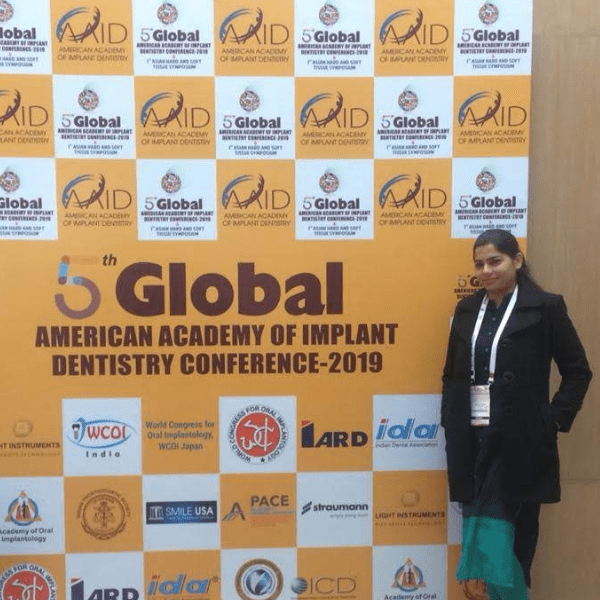
Who is the Writer?
Dr. Kirti Parashar is a licensed prosthodontist with a Bachelor of Dental Surgery and a Master of Dental Surgery (MDS) in Prosthodontics and Crown & Bridge from Pandit Bhagwat Dayal Sharma University of Health Sciences, Rohtak, India. She is a consultant prosthodontist and passionate about using the latest dental technologies and techniques to provide her patients with the best possible care.